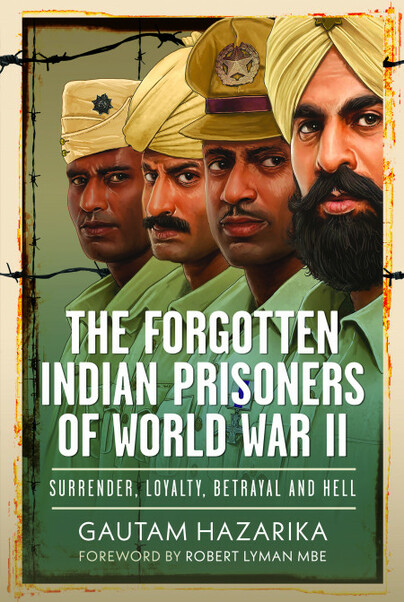The Forgotten Indian Prisoners of World War II (Hardback)
Surrender, Loyalty, Betrayal and Hell
Imprint: Pen & Sword Military
Pages: 224
Illustrations: 40 mono illustrations
ISBN: 9781036124380
Published: 30th November 2025
(click here for international delivery rates)
Order within the next 28 minutes to get your order processed the next working day!
Need a currency converter? Check XE.com for live rates
Singapore 1942. This is the story of Captain Mohan Singh, 14 Punjab Regiment, the first commander of the Indian National Army (INA) supported by Japan to expel the British from India. Of the soldiers who found it a great attraction or an impossible dilemma. Of the great risk Singh took in breaking with the Japanese when he realised they were not sticking to their promises. Of Subas Chandra Bose’s tryst with destiny when he was then called to take over the mantle. Of the thousands of INA men who died of sickness and starvation in Burma. Of those who fought bravely when they got a chance. Of how though the INA lost the battle, it won the hearts of the people of India and hastened independence.
It is the story of Lieutenant MM Pillai’s daring escape from Singapore. Of Warrant Officer John Baptist Crasta, one of 17,000 Indian POWs sent to hard labour camps in the Pacific, of whom over 10,000 died. Of the war crimes trials held by the Australians for Japanese atrocities against these POWs where Subedar Chint Singh was a key witness. Finally, it is the story of wives waiting for 5 years with little news of their soldier husband.
How the INA was started 18 months before Bose reached and what happened to Indian soldiers when Mohan Singh disbanded the first INA, is a lesser known chapter of Indian and World War II history that deserves more telling. Hazarika’s narrative using their largely unpublished words & interviews with family members, is a gripping story of loyalty, of daring escapes and double crosses, and adversity in captivity. He appeals for more commemoration of these soldiers.
“The history of Indian soldiers in WW2 is rarely told except perhaps in the context of Netaji Subhas Bose and the Azad Hind Fauj. There are, however, other stories that can be told. For instance, what is the importance of Rajdhani Hotel, Bangkok? What happened on the bridge over the River Muar? And, what was the fate of the Indian soldiers who, for whatever reason, did not join the Azad Hind Fauj? In his very first book, Gautam Hazarika explores these side streets to bring alive an important but chaotic period in world history?”
Sanjeev Sanyal, author
Hazarika adeptly rescues an important slice of history from the shadowy margins of World War II. Going well beyond dry and dusty records, his breezy and well-researched narrative of the Indian National Army’s birth and evolution never falters, gripping you with every clever twist. It pulses with the heartbeats of soldiers, as it mines their thoughts, maps their dilemmas, teases out their deceptions, and foregrounds their courage, loyalty and spirit of sacrifice.
Mukund Padmanaban, author of The Great Flap of 1942
Gautam Hazarika’s book, effectively an Indian history of the INA, is a remarkable work. It is the Indian point-of-view, yet as far as possible unemotional, one-volume retelling that this episode of India’s history demands. It accounts for the “first” INA of Mohan Singh, as well as the later INA of Subhash Chandra Bose. It is clear-eyed about the limits and extent of the INA’s battlefield success, as against the extent and limits of its political success. It is densely-annotated, and topped off with unusual, faithfully-rendered illustrations. Highly recommended.
KS Nair, author
The events of the second world war in Asia shaped the legacies that affect the lives of millions of South Asia's inhabitants today. This book sheds new light on certain lesser known aspects of India's involvement in the war, with a particular focus on the war in East Asia, and the saga of suffering, loyalty and sacrifice of the forgotten Indian FEPOWs (Far East Prisoners of War), whose story was overshadowed by that of the Indian National Army and the tumult and chaos of independence and partition.
Sq Ldr Rana Chinna MBE author and military historian
"An important book that highlights the suffering and fortitude of the forgotten Indian prisoners of the Japanese. This is a vital contribution on a neglected subject, and it deserves a wide readership."
Kevin Noles, author of Indian Prisoners of War in Japanese Captivity during World War Two
"A powerful and deeply human account of Indian soldiers held by the Japanese in WWII. Gautam Hazarika brings long-forgotten voices to life with care and clarity. I’m glad I could assist in a small way with this important work that finally gives these men the recognition they deserve."
Major General Syed Ali Hamid (Retired)
"A prodigiously researched book that tells one of the great untold stories of the second world war in great style and conviction making it a page turner. It fills a gap on a subject that has been neglected by historians and film makers reflecting their Euro and American centric biases."
Mihir Bose
"Richly detailed and remarkably researched, The Forgotten Indian Prisoners of World War II offers a fascinating account of a lost chapter in India's freedom struggle. Sober and unromanticised in its tone, it is nonetheless a moving story of some extraordinary individuals, navigating a time of conflict and profound--even traumatic--change. In recovering this crucial web of 'micro-histories', Gautam Hazarika makes a solid contribution to our understanding of the period and its layered dynamics."
Manu Pillai
Gautam Hazarika's copiously researched book reveals the forgotten stories of Indian POWs in World War 2- some who fought the British for an independent India, others that suffered Japanese brutality and a few that pulled off spectacular escapes. He weaves in nuanced positions on history that sometimes challenge popular conceptions. Informative, exciting and at times provocative, this book makes an interesting read, indeed.
Viajy Balan, Author of "The Swaraj Spy"
'Hazarika’s powerful and moving account uncovers a forgotten chapter of history-the haunting journeys of Indian prisoners of war in the east during World War II. Through painstaking research and compassionate storytelling, this book resurrects the tortured voices of those silenced by captivity, torn from home, and erased from memory.'
Rajesh Rai, Associate Professor & Head, South Asian Studies Programme, National University of Singapore
About Gautam Hazarika
Gautam Hazarika is Singapore based and after being a banker most of his life, now researches World War II in Southeast Asia. His focus is on lesser-known stories such as the Indian army, the anti-Japanese resistance and war crimes trials. This is his first book.














